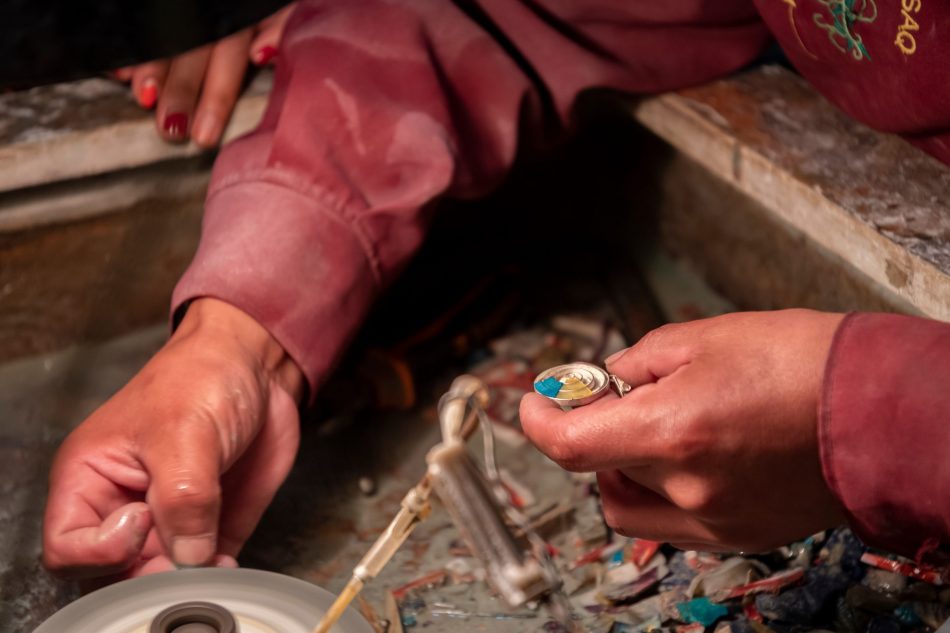As the original stewards of the land, Indigenous peoples have long been at the forefront of environmental movements, including community sustainability. One way to help the environment on an individual level is to support native-owned businesses that offer consumers sustainable products. Here are 12 Indigenous-owned brands to look into.
The Orenda Tribe
This company was inspired by founder Zaid Souqi’s experience working with orphans and children. Its mission “is to raise awareness on social issues through art and storytelling.” The company, which launched in 2016, has three main values: empowerment, community, and sustainability.
The Orenda Tribe educates youth with art workshops that focus on a range of topics such as child marriage, bullying, and environmental pollution. For every t-shirt purchased, the company enrolls a child in its art of hope initiative, a program that empowers children in need from orphanages, refugee camps, and hospitals in Jordan.
Maloga Art
The artist behind @malogaart is Shanai Kellet, of Yorta Yorta/Juru descent. She makes contemporary Indigenous ‘sand art’ that “symbolizes the connection to Mother Nature and earth.” The word Maloga means sand in the Yorta Yorta language. Kellet is a third-generation sand artist and employs a traditional technique that was originally developed by the Yorta Yorta people. She learned it from her mother, who was taught by her uncle before that.
Totem Design House
This family-owned Indigenous brand prioritizes honoring cultural knowledge. It boasts a line of jewelry, home décor, fine arts, and botanical wellness products. The company ensures that each product has a low environmental footprint by sourcing locally and producing in-house. On top of that, it donates part of the proceeds to Copper Legacy Indigenous Empowerment Society, a non-profit that supports Indigenous programs and projects.
Deadly Denim
Deadly Denim is an Indigenous brand that honors Indigenous history and culture by collaborating with First Nation artists. Their line is made of recycled denim and textile industry waste that would otherwise end up in a landfill. Indigenous art and the culture of sewing are essential to the production cycle.
A portion of the company’s profits goes towards the Rhodanthe Lipsett Indigenous Midwifery Charitable Fund (RLIMCF), an organization dedicated to saving lives through traditional midwifery training.
Bush Medijina
This skincare company offers their clients modern skincare options that are produced with traditional methods that have been passed down through generations. If you want handmade products made from locally harvested native botanicals, then this is the brand for you. Every purchase helps fund a program called The Bush Medijina Shed, which empowers Indigenous women and heightens cultural knowledge in the region.
Clothing the Gaps
The team behind this brand strives to produce “merch with meaning” that will open conversations about the issues Aboriginal people face. Its products celebrate Aboriginal ways of life and practice sustainable production. Currently, it has an Ethical Clothing Australia accreditation and is striving to get Social Traders and B Corporation Australia certifications.
Earth Jinda
Earth Jinda, previously called Earth Blended, was founded by Gumbaynggirr mother and aromatherapist Jame Telfer. She blends Indigenous culture with essential oils through her use of traditional methods and recipes that work in tandem with modern knowledge. “All of our products are cruelty-free, Australian made, ethically sourced, and packaged with as minimal waste as possible,” she says. “Each product is made with not only the Aromatherapy qualification and safety guidelines followed but also cleansed with a native eucalyptus burning bundle.”
Kirrikin
Another brand from Australia, Kirrikin’s products start off with a foundation of sustainable fabrics that are made of recycled plastic, silk, cashmere, and wood pulp. The end products are luxury resort wear produced in collaboration with Indigenous artists, who each earn a percentage of each sale that features their work.
Bush Magic Metal
This jewelry line uses recycled silver and is inspired by the history of the Australian native bush. Jess, the artist and a recent nominee for the National Indigenous Fashion Awards, is of Munujali and Butchulla descent and practices silversmithing in a way that combines both ancient and modern traditions.
Trickster Company
This Indigenous-owned design shop was founded by siblings Rico and Crystal Worl. Their line features a variety of apparel, paper, home goods, and sports products that all honor indigenous design.
Lowanna Natural Skincare
This skincare line is made from natural, plant-based, and native ingredients that have been traditionally used for generations. The founder, Sinead, is a “proud descendent of the Narungga people of the Yorke Peninsula region.”
Beyond Buckskin Boutique
This North Dakota-based boutique is determined to connect Indigenous artists with the rest of the world and works with more than 40 artists to do so. Each artist creates unique and authentic Native American and First Nations jewelry and apparel which is made with natural materials and features ancient patterns that were created through traditional methods.











